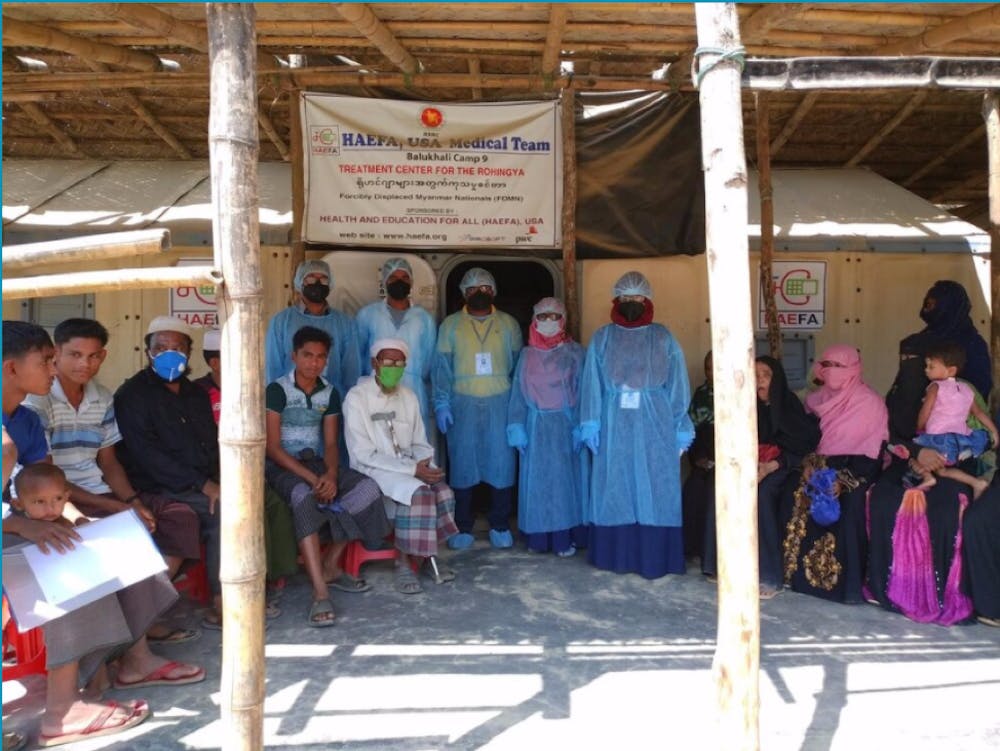Associate Professor of Surgery Ruhul Abid is one of 318 candidates in the world to receive a nomination for the 2020 Nobel Peace Prize for his nonprofit organization Health and Education for All. As part of HAEFA’s many efforts, the nonprofit has partnered with other organizations this year to combat COVID-19 in refugee camps.
While the Nobel Committee does not publish nominees for 50 years, HAEFA’s nomination by the University of Massachusetts Boston was confirmed by Associate Professor of Anthropology at UMass Boston Jean-Philippe Belleau in an email to The Herald. In order to be nominated, a person must be recommended by a qualifying individual, as is outlined on the The Nobel Prize website. Nobel laureates will be selected from the pool of candidates in October.
Abid founded HAEFA in 2012 to provide free health care to people who lack access to it. “The goal is to serve the underprivileged and displaced peoples and bring them under universal health coverage,” he said.
His inspiration for HAEFA started long before its founding. After graduating from Dhaka Medical College and Hospital, Abid worked as a medical officer for more than three years in the tea-producing divisions of Bangladesh, where he established a health care system for workers in the region that covered health screenings, immunizations and treatments. “The work inspired me very much,” he said.
Abid then went to Japan for his PhD and later completed his fellowship with Harvard Medical School in 2001. “During that time I was thinking, how can I get back and do something for the people of Bangladesh,” Abid said. The collapse of Rana Plaza in Dhaka, an accident that killed over 1,000 people, prompted him to carry out his vision for HAEFA: to provide health care to vulnerable garment workers.
“In 2006, I was already planning a way to help Bangladesh,” he said, adding that the accident “actually sparked me to finally act.”
Since then, Abid and HAEFA have worked to provide free health care to underprivileged people throughout Bangladesh. The organization has provided health screenings and follow-up treatments for 30,000 garment workers, free health care for 145,000 Rohingya refugees and cervical cancer screenings for those in Northern Bangladesh, a region with few resources.
According to the United Nations, Rohingya refugees, who have fled to Bangladesh from the neighboring country Myanmar, and are “the most persecuted minority in the world,” Abid said.
The Cox’s Bazar district in Bangladesh — the primary recipient of HAEFA’s aid — has become “the world’s largest refugee camp,” according to the United Nations Office for the Coordination of Humanitarian Efforts. The area is home to over 700,000 displaced persons who have had to leave Myanmar due to discrimination, violence and denial of human rights, according to OCHA and BBC.
The garment workers HAEFA has assisted are especially vulnerable given the dangerous nature of their work, according to HAEFA’s website.
“With the help of Brown University’s Global Health Initiative Director Susan Cu-Uvin, ... we trained nurses and midwives to provide cervical cancer screening, and we engaged the community and health care workers so they would go and convince people” to get screened, Abid added.
HAEFA’s innovative Electronic Medical Record software system, NIROG — Bangla for ‘absence of disease’ — is another one of the organization’s significant contributions in providing health care. NIROG has been used in Rohingya refugee camps to help document long-term illness, as most refugees have no health care records and their long-term conditions are usually overlooked. NIROG was developed in 2016 as a solar-powered, portable and individualized patient record system that better allowed Abid and other health care professionals to create, record and retrieve patients’ medical records.
In the last six months, HAEFA has been working to combat the spread of COVID-19 in Rohingya refugee camps. “We founded (the) Students for HAEFA fundraiser where we raised over 70,000 U.S. dollars for the COVID-19 emergency response,” said Jenna Mullen ’22, HAEFA’s COVID-19 emergency coordinator.
The money from the fundraiser has enabled HAEFA to supply personal protective equipment to medical professionals working in Bangladesh, including over 10,000 KN95 masks and essential inhalers. The organization also distributed “hygiene packets for high-risk refugees,” cloth masks, thermometers and toiletries, Mullen added.
HAEFA initiated a collaboration between the Watson Institute for International and Public Affairs and Project HOPE, a global health care organization, at the University in another effort to fight COVID-19 in the refugee camps. The goal is to train over 3,600 health care workers to provide COVID-19 patient care. The program, called Training of Trainers, provided three, four-day, online training sessions for COVID-19 competency.
“Brown, in collaboration with Project HOPE, trained the first line of medics. Those medics go on to train more people so there is an exponential effect on who has been trained,” said Phoebe Kennan ’21, a HAEFA student coordinator and co-founder of the Students for HAEFA fundraiser. The group-organized trainings provided certification to workers and served as a liaison between the medical trainers, the trainees and the groups involved in the effort, Kennan added.
“So far we’ve covered almost 1,200 healthcare professionals, and we’re planning for more training sessions in the fall,” Abid added.
Abid hopes to continue his humanitarian work into the future. “My long-term dream is to do something in Rhode Island. There are people in Rhode Island without insurance, refugee populations, and they need quality health care,” Abid said.
“I also want to raise awareness of exploited people, the workers and the underprivileged,” he added. “I want to bring hope and universal health care to (the Rohingya refugees), to whatever capability I have.”

Jared is a Senior Staff Writer for Science and Research. He is a senior from Albuquerque, New Mexico studying physiology and biotechnology. Outside of The Herald he likes to fish, ride bikes and research the role of metals in human health and disease.





